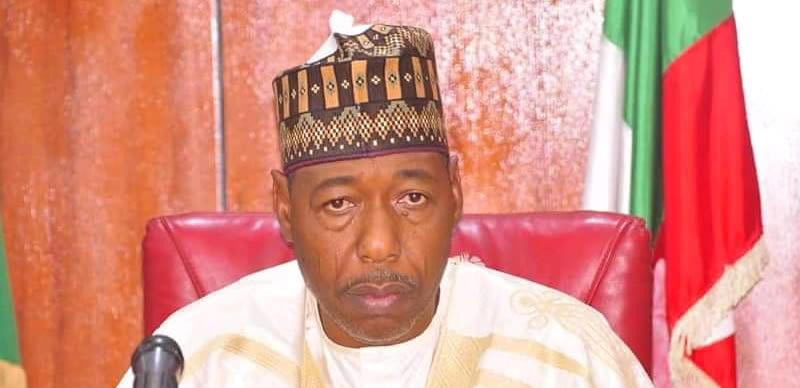Africa
Lafarge SA Pleads Guilty to Providing Support to ISIS, Fined $778m in US

The stock price of Lafarge Africa Plc depreciated by 2.13 per cent to N23.00 per share on Tuesday, from the N23.50 it opened on the Nigerian Exchange Limited (NGX) following reports that its parent company, Lafarge SA has agreed to pay financial penalty of nearly $778 million and also pleaded guilty to a United States federal court of conspiring to provide material support to ISIS and another terrorist organisation.
The stock price of the cement producing company on the NGX had remained flat since September 21, 2022, but depreciated to N23 per share on Tuesday.
Capital market analyst said the sanction imposed on its parent company was going to affect its performance on the NGX.
The company has pleaded guilty to a United States federal court of conspiring to provide material support to ISIS and another terrorist organisation.
It was an unprecedented corporate prosecution under the material support of terrorism law, according to the US Justice Department.
The company pleaded guilty in a Brooklyn federal Court on Tuesday.
The $10.24 million in payments to ISIS, the al-Nusrah Front and intermediaries were made from August 2013 through October 2014, and occurred even as the terror group was kidnapping and killing Westerners.
“Lafarge has admitted and taken responsibility for its staggering crime,” said U.S. Attorney Breon Peace in a statement.
“Never before has a corporation been charged with providing material support and resources to foreign terrorist organizations.”
Peace’s office said Lafarge Cement Syria executives bought materials needed for their cement plant in the Jalabiyeh region of northern Syrian from ISIS-controlled suppliers, and paid monthly “donations” to ISIS and ANF, so that employees, customers and suppliers could cross checkpoints around the plant.
Lafarge Cement Syria “eventually agreed to make payments to ISIS based on the volume of cement that LCS sold to its customers, which Lafarge and LCS executives likened to paying ‘taxes,” Peace’s office said.
“In the midst of a civil war, Lafarge made the unthinkable choice to put money into the hands of ISIS, one of the world’s most barbaric terrorist organizations, so that it could continue selling cement,” said Peace.
“Lafarge did this not merely in exchange for permission to operate its cement plant – which would have been bad enough – but also to leverage its relationship with ISIS for economic advantage, seeking ISIS’s assistance to hurt Lafarge’s competition in exchange for a cut of Lafarge’s sales,” Peace said.
Lafarge was purchased by Switzerland-based Holcim in 2015.
“Lafarge SA and LCS have accepted responsibility for the actions of the individual executives involved, whose behavior was in flagrant violation of Lafarge’s Code of Conduct.
“We deeply regret that this conduct occurred and have worked with the U.S. Department of Justice to resolve this matter,” the company said in a statement.
The company’s dealings with the terrorist group were the subject of an internal investigation several years ago. At the conclusion of the probe, the corporation said employees of a legacy company were paying off intermediaries without regard to the identity of the groups involved in order to keep operations running and the plant safe as violence escalated in the region.
“The combination of the war zone chaos and the ‘can-do’ approach to maintain operations in these circumstances may have caused those involved to seriously misjudge the situation and to neglect to focus sufficiently on the legal and reputational implications of their conduct,” Lafarge Holcim, as the company is now known, had said in a public statement in 2017.
Magali Anderson, a top executive at Lafarge, pleaded guilty on behalf of the company.
Holcim in a statement to CNBC said it supports the plea agreement that Lafarge reached with DOJ.
“None of the conduct involved Holcim, which has never operated in Syria, or any Lafarge operations or employees in the United States, and it is in stark contrast with everything that Holcim stands for,” Holcim added in the statement.
“The DOJ noted that former Lafarge SA and [Lafarge Cement Syria] executives involved in the conduct concealed it from Holcim before and after Holcim acquired Lafarge SA, as well as from external auditors,” Holcim stated.
“When Holcim learned of the allegations from media reports in 2016, Holcim proactively and voluntarily conducted an extensive investigation, led by a major U.S. law firm and overseen by the Board of Directors. It publicly disclosed the principal investigative findings in 2017 and separated from former Lafarge SA and LCS executives who were involved in these events.”
However, an analyst at PAC Holdings, Mr. Wole Adeyeye attributed the decline in Lafarge Africa’s shares to general stock market weak sentiment by investors, stating that investors understand Lafarge Africa is a subsidiary that is wholly a Nigerian entity.
Africa
When the Gatekeeper Fumbles: JAMB’s Error and the Future of Our Youth

When the Gatekeeper Fumbles: JAMB’s Error and the Future of Our Youth
By Matthew Eloyi
It is not every day that a public official publicly sheds tears. And so, when the Registrar of the Joint Admissions and Matriculation Board (JAMB), Professor Ishaq Oloyede, broke down while admitting to errors in the conduct of the 2025 Unified Tertiary Matriculation Examination (UTME), it was a deeply emotional moment. But make no mistake: while the tears may have reflected remorse, they cannot wash away the consequences of what is, quite frankly, a systemic failure.
Let us be clear — JAMB is not merely an examination body. It is a gatekeeper to higher education in Nigeria. It is the bridge between dreams and their realisation for millions of young Nigerians. To fumble that responsibility is not a technical error; it is a breach of trust with life-altering consequences.
With nearly 380,000 candidates now required to retake the exam due to technical glitches and irregularities, one cannot help but ask: How did we get here? And more importantly, why does this keep happening?
For years, JAMB has marketed its transition to computer-based testing as a step toward modernisation. Yet each year seems to expose new cracks in its implementation — from faulty computer systems and power outages to incomplete biometric verification and poorly configured questions. These are not unforeseeable anomalies. They are predictable outcomes of poor planning, lack of oversight, and inadequate investment in infrastructure.
Imagine the psychological toll on the students, many of whom studied day and night, only to be met with malfunctioning systems and flawed questions. Some walked out of examination halls in tears, their confidence shattered, their futures placed in limbo. For those in remote or under-resourced areas, the technical errors are compounded by infrastructural and economic disadvantages. What we are witnessing is not just an exam failure; it is an institutional failure that amplifies inequality.
JAMB’s decision to allow affected candidates a resit is necessary, but it is insufficient. What about those who may never realize they were victims of the glitch? What about those whose faith in the process has been irreparably broken?
Professor Oloyede’s tears may have been sincere, but what Nigerian students need now is not emotion — it is accountability. Heads must roll, systems must be overhauled, and the entire structure must be audited. We cannot allow a body that plays such a pivotal role in shaping the nation’s intellectual future to operate with such recklessness.
The UTME is a rite of passage for Nigerian students; it should not become a roulette of misfortune. Until JAMB can guarantee a glitch-free, fair, and standardised assessment, its credibility will remain on shaky ground.
In the end, our children deserve better. They deserve an education system that works; not one that breaks down and apologises after the damage is done.
Africa
ECOWAS Confirms Burkina Faso, Mali, Niger’s Exit, Keeps Doors Open for Return

The Economic Community of West African States (ECOWAS) has confirmed that the withdrawal of Burkina Faso, Mali, and Niger from the regional bloc takes effect from January 29, 2025.
ECOWAS spokesperson Joel Ahofodji, in a statement on Wednesday, said the decision aligns with the ECOWAS authority’s resolution and reflects the spirit of regional solidarity and the interests of the people.
Despite their exit, Ahofodji emphasized that the bloc remains open to the return of the three Sahel nations whenever they choose.
“All relevant authorities within and outside ECOWAS Member States should take note of this development,” he said.
To minimize disruptions, ECOWAS urged the continued recognition of national passports and identity cards bearing the ECOWAS logo held by citizens of Burkina Faso, Mali, and Niger until further notice.
Additionally, the commission called for the continued application of the ECOWAS Trade Liberalisation Scheme (ETLS) and investment policies for goods and services from the departing nations. It also stressed that their citizens should retain the right to visa-free movement, residence, and establishment under existing ECOWAS protocols.
Furthermore, ECOWAS requested full support and cooperation for its officials from the three countries as they continue their assignments.
“These arrangements will be in place until the full determination of the modalities of our future engagement with the three countries by the ECOWAS Authority of Heads of State and Government,” Ahofodji stated.
He revealed that ECOWAS has set up a structure to facilitate discussions on these modalities, ensuring a smooth transition.
“This message is necessary to avoid confusion and disruption in the lives and businesses of our people during this transition period,” he added.
The News Agency of Nigeria (NAN) reports that Burkina Faso, Mali, and Niger initially announced their intention to leave ECOWAS on January 29, 2024, in accordance with the bloc’s protocol, which allows for a 12-month notice period. In December 2024, ECOWAS officially acknowledged their right to exit but reiterated its willingness to welcome them back in the future.
Africa
Customs hands over illicit drugs worth N117.59m to NDLEA

The Nigeria Customs Service (NCS), Ogun Area 1 Command, has handed over illicit drugs worth N117.59 million to the National Drug Law Enforcement Agency (NDLEA).
The Comptroller of the command, Mr James Ojo, disclosed this during the handing over of the drugs to Mr Olusegun Adeyeye, the Commander of NDLEA, Idiroko Special Area Command, in Abeokuta, Ogun, on Friday.
Ojo said the customs handed over the seized cannabis and tramadol tablets to the Idiroko Special Command for further investigation in line with the standard operating procedures and inter-agency collaboration.
He said the illicit drugs were seized in various strategic locations between January and November 21, 2024, in Ogun State.
He added that the illicit drugs were abandoned at various locations, including the Abeokuta axis, the Agbawo/Igankoto area of Yewa North Local Government Area, and Imeko Afton axis.
Ojo said that the seizure of the cannabis sativa and tramaling tablets, another brand of tramadol, was made possible through credible intelligence and strategic operations of the customs personnel.
“The successful interception of these dangerous substances would not have been possible without the robust collaboration and support from our intelligence units, local informants and sister agencies.
“These landmark operations are testament to the unwavering dedication of the NCS to safeguard the health and well-being of our citizens and uphold the rule of law,” he said.
He said the seizures comprised 403 sacks and 6,504 parcels, weighing 7,217.7 kg and 362 packs of tramaling tablets of 225mg each, with a total Duty Paid Value of N117,587,405,00.
He described the height of illicit drugs smuggling in the recent time as worrisome.
This, he said, underscores the severity of drug trafficking within the borders.
“Between Oct. 13 and Nov. 12 alone, operatives intercepted a total of 1,373 parcels of cannabis sativa, weighing 1,337kg and 362 packs of tramaling tablets of 225mg each,” he said.
Ojo said the seizures had disrupted the supply chain of illicit drugs, thereby mitigating the risks those substances posed to the youth, families and communities.
He lauded the synergy between its command, security agencies and other stakeholders that led to the remarkable achievements.
Ojo also commended the Comptroller General of NCS for creating an enabling environment for the command to achieve the success.
Responding, Adeyeye, applauded the customs for achieving the feat.
Adeyeye pledged to continue to collaborate with the customs to fight against illicit trade and drug trafficking in the state.
-

 Headlines4 years ago
Headlines4 years agoFacebook, Instagram Temporarily Allow Posts on Ukraine War Calling for Violence Against Invading Russians or Putin’s Death
-

 Headlines4 years ago
Headlines4 years agoNigeria, Other West African Countries Facing Worst Food Crisis in 10 Years, Aid Groups Say
-

 Foreign4 years ago
Foreign4 years agoNew York Consulate installs machines for 10-year passport
-

 News1 year ago
News1 year agoZero Trust Architecture in a Remote World: Securing the New Normal
-

 Entertainment3 years ago
Entertainment3 years agoPhyna emerges winner of Big Brother Naija Season 7
-

 Headlines2 years ago
Headlines2 years agoNigeria Customs modernisation project to check extortion of traders
-

 Entertainment2 years ago
Entertainment2 years agoMovie download platform, Netnaija, announces closure
-

 Economy2 years ago
Economy2 years agoWe generated N30.2 bn revenue in three months – Kano NCS Comptroller
















